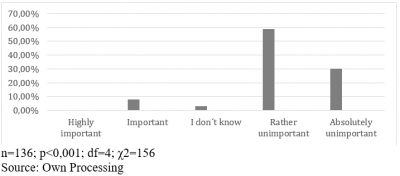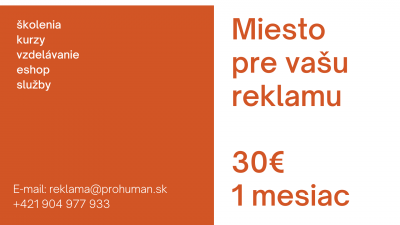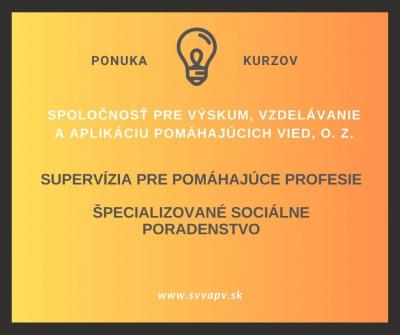Abstract: The aim of our contribution is to analyze the conditions of performance of the activities of social curators and other selected workers of the departments of social and legal protection of children and social guardianship of the Offices of Labour, Social Affairs and Family in the Slovak Republic from the point of view of their employees. A mixed research paradigm was used, aimed at identifying indicators of the conditions of professional activity of child social and legal protection workers in Slovakia. This cross-sectional descriptive method was focused on the perception of the relevance of the problematic areas of the analyzed contexts. A validated questionnaire developed by researchers was used as a data collection tool. The obtained data were subjected to descriptive statistics. Second-level statistical analyses present the results in relation to the research sample. The article presents selected research findings that point to the need of creating suitable conditions as a prerequisite for improving the quality of one's work, as well as a prerequisite for effectively solving the adverse life situations of clients, which is indirectly related to the broader context of quality of life and thus also to healthy well-being and the psychological health of all stakeholders. The research findings can significantly support the improvement of the conditions for the performance of professional activities of social curators, especially by providing authorities in the field of this spectrum of activity with sufficient evidence of the ongoing unfavorable situation in the field of their working conditions.
Key words: social guardianship, social curator, social and legal protection of children, performance conditions, professional status
1 Introduction
The context with the conditions of the professional practice of social workers is often a more or less informally presented topic in the social sector. In recent years in Slovakia, discussions have resonated about ongoing problems in the activities of social curators and other professional employees of social and legal protection of children and social guardianship of the Offices of Labour, Social Affairs and Family. In particular, the high rate of worker’s fluctuation, workload, insufficient financial evaluation, as well as collisions in cooperation with other experts and interested entities in the framework of solving the adverse social situation of clients, whether it is a family, a child or an adult individual, have been pointed out. This fact seems to be in sharp contrast to the legislative development, professionalization and narrow specialization of social guardianship in Slovakia, especially since 2005. Our research goal is to analyze the conditions of the performance of activities of social curators and other selected workers of the departments of social and legal protection of children and social guardianship of the Offices of Labour, Social Affairs and Family in the Slovak Republic from the perspective of the workers themselves.
2 From social prevention to social guardianship
After 1989, a legislative concept was gradually formed in Slovakia for the activities that fall under the subject of our contribution. One of the important milestones was the Act on Social Assistance No. 195/1998 Coll. This act, after more than 40 years, introduced the term "social legal protection", adjusted its activities and at the same time adjusted the term "social prevention" for the first time. In it, social legal protection was understood as an activity to protect the rights and legally protected interests of citizens, especially minors, namely through educational activities, organizing substitute family care and deciding on the immediate placement of a child in substitute care or on educational measures (§ 13 of the Social Assistance Act). Although some activities of social legal protection of children fall into the area of social guardianship (e.g. participation in criminal proceedings against minors), this term has not yet been used. Other activities, which we currently include in social guardianship, belonged to social prevention. This was also carried out for minors with behavioral disorders, neglecting compulsory school attendance, for whom the court ordered institutional education or imposed protective education, or who committed acts with elements of a criminal offense (cf. § 5 of the Social Assistance Act). In addition, social prevention was carried out for an adult citizen who was conditionally suspended from serving a prison sentence or was released from serving a prison sentence or from prison, or who was released from a medical facility for the treatment of drug addicts or from a facility for the resocialization of drug addicts.
Further legislative changes took place in 2005, which we can rightly consider a milestone in the current understanding of social guardianship in Slovakia. Two key laws in the field of family law were adopted that year, which also implemented international obligations in the field of child rights protection, especially the Convention on the Rights of the Child (UN, 1989). The first was Act No. 36/2005 Coll. on the family and on the amendment of some laws. The second was Act No. 305/2005 Coll. on the social and legal protection of children and on social guardianship and on the amendment and supplementation of certain laws to eliminate, alleviate and prevent the deepening or recurrence of disorders of psychological development or physical development (hereinafter referred to as the "Act on SPODaSK"), which, together with other legal regulations, have created legislative conditions in Slovakia since 2005 for the comprehensive implementation of measures of social and legal protection of children and social guardianship. In it, the term social guardian was used for the first time in Slovak legislation and basically replaced the term "social prevention" in the Social Assistance Act. Content-wise, it corresponds to selected primary prevention measures. In the relevant law, social guardianship is understood as a set of measures pertaining to the social development of a child and an adult and the provision of assistance depending on the severity of the disorder and the situation of the child or adult (paragraph 1, section 3 of the Act on SPODaSK). It distinguishes between the social guardianship of children and the social guardianship of persons of legal age. A qualifying prerequisite for the performance of social guardianship measures is a 2nd-level university education in the field of social work; in the case of social guardianship for adults, it can also be a university education in the field of andragogy. The activities that are carried out within the framework of social guardianship of children and social guardianship of adults are described in detail in the law (cf. § 17 and § 19) and the internal standards of the Center for Labour, Social Affairs and Family. These are highly professional activities in the field of social diagnostics, social intervention, prevention, conducting motivational interviews, active networking of assistance, coordination of assistance, as well as administration of all these activities, in accordance with the provisions of administrative law. The amount and nature of these professional activities implied the need for special education of future social curators and the understanding of social curatorship/ guardianship as a specialization within social work.
3 Social guardianship as specialization
The legislative platform for specialized professional activities ("specializations'') was created in Slovakia by Professional Act No. 219/2014 Coll. on social work and on the conditions for the performance of certain professional activities in the field of social affairs and the family and on the amendment and addition of certain laws. They are understood as a set of work activities of a narrower focus of social work in the established specialized field of social work, for the implementation of which knowledge and skills acquired by completing an accredited specialized educational program are necessary (§ paragraph 2, section 2 of Act No. 219/2014 Coll. hereinafter referred to as "SEP''). According to the Professional Act, all SEPs must be accredited, while their list and specific standards will be established by the government through regulation (Section 29). The working documents for the first SEP were created within the framework of the national project Support for increasing the professionalism of performance and development of human resources in the field of performance and social inclusion services for state administration and self-government I ("Profi I") in 2014-2015 (Mátel, Galáš, Kuchárová 2015). The first two Slovak specialized fields are, according to the Regulation of the Government of the Slovak Republic no. 5/2016 Coll. social assessment activity and social tutoring. Standards were also established for both specializations. According to the standard for the SEP "Social curator", this consists of theoretical and practical training. The preparation lasts at least 12 and at most 18 months. The total scope of training is 230 hours. Part of the total scope is also work under supervision in the scope of at least 40 hours. The competent body for granting accreditation is the Accreditation Commission of the Ministry of Labour, Social Affairs and Family of the Slovak Republic for the field of education. In 2021, the Institute for Work and Family Research was granted accreditation for the SEP – Social guardianship (Mátel 2021). This contribution organization of the Ministry of Labour, Social Affairs and Family of the Slovak Republic started the "specialization" training of social curators from all over Slovakia within the framework of the national project "Profi II", within the Human Resources Operational Program. The specialized education of social curators actually started in March 2022, and in August 2023, the first social curators (146 successful graduates) successfully passed the specialization exam. Social curators of children, social curators of adults or social curators working with both target groups are currently in Slovakia specialists with their own competences and, as employees of the SPODaSK, important workers in criminal and misdemeanor proceedings against children or juveniles. Courts very often issue decisions in accordance with the results of the investigation and the recommendations of the SPODaSK staff. In summary, it can be concluded that since 2005, the activity of social guardianship in Slovakia has not only been legally defined in detail, but also highly professionalized and specialized. Closely related to this is the professional status of social curators, a higher level of their own competences, authority and acceptance by other professional workers, including judges and members of the Police Force. Does the subjective perception of the social curators themselves correspond to this fact? To answer this question, we prepared and implemented a research study, its most important part being the working conditions of social curators.
4 Working conditions of social curators
Although the Act on SPODaSK differentiates between social guardianship and social protection of children in terms of terminology and content, these are de jure and de facto inseparable in practice. Central responsibility for the implementation of SPODaSK measures was assumed by the institutions of social and legal protection of children and social guardianship, which in Slovakia are the Headquarters and Offices of Labour, Social Affairs and Family (hereinafter "ÚPSVaR"). These were established in Slovakia on the basis of Act no. 453/2003 Coll. on state administration bodies in the field of social affairs, family and employment services, as amended. Currently, there are 46 of them in Slovakia, while SPODaSK measures are also carried out at the detached workplaces of these offices, a total of 79 workplaces. In Slovakia, social curators are employees of ÚPSVaR (specifically SPODaSK departments), so they are employed by the state. In the past, Lešková (2012) described problems in the material and technical equipment and spatial conditions of the SPODaSK body. According to the author, the effect of the social curator's work is largely dependent on the external conditions in which his/her work takes place. Lešková (2012) described four problem areas that can be encountered in the working environment of social curators at the SPODASK ÚPSVaR department: 1. material and technical equipment of the social curator's workplace (among other things, outdated computer technology, constant changes to programs and software, absence of air conditioning, noise in the workplace, inappropriate lighting); 2. spatial conditions (especially a large number of workers in one office, absence of a separate room for working with the client, absence of barrier-free access in offices); 3. work climate (lack of collective cohesion, unfairness in the personal evaluation of employees, high demands and excessive control by superiors, sometimes also the presence of mobbing and bossing in the workplace), 4. load of the number of clients (includes a low number of social curators, a high number of clients on one curator, the time-consuming scope of actions resulting from the Act on SPODaSK, the deficit of determining the maximum number of clients per worker, etc.). In general, we can state that research into the working conditions of workers in the social sphere is rare in Slovakia (cf. Danišková 2014; Mesárošová 2017). From abroad we can mention authors such as Staub-Bernasconi (2013), Davies and Jones (2016), Asquith, Clark, Waterhause (2005) or Allen et al. (2004). One of the few researches in the subject area was also carried out in Slovakia by the Public Ombudsman in 2012. Its aim was to gain knowledge about the work of SPODaSK ÚPSVaR departments in Slovakia from the point of view of the workers themselves, namely about their activities, working conditions, and problems and their proposed solutions. It was a questionnaire survey of their own provenance, in which 320 respondents participated (after sorting n = 292), which was a sample of about 50% of the total group. In the end, the research implementers stated: "The overall picture of the work of the SPODaSK department and its conditions, which the respondents portrayed in their answers, is serious and tends towards pessimism. It appears that their work, however socially necessary and meritorious, brings them little personal satisfaction. They generally feel neglected, whether in their financial evaluation, but also in the material equipment of their workplace. They lack basic conditions for the performance of their work as they imagine it - that is, mainly work with citizens. They have nowhere to talk to them undisturbed or privately (they are several workers in one office), it is difficult for them to get to clients in the field (they do not have cars to use or there is a problem with reimbursement of travel expenses), they have little time for clients (most of it is taken up by paperwork, records, statistics, reports, information technologies hinder rather than help them in this)" (Kancelária, 2012:23). The research of Danišková (2014) was focused on the connections between hygienic and motivational factors and the job satisfaction of social workers in the field of social protection of children. The goal of the research was to verify the validity of Herzberg's statement that job satisfaction is fueled exclusively by motivational factors and job dissatisfaction is caused by an insufficient level of hygiene factors. In the research, the problems of workers related to personnel undervaluation of workplaces, high workload and excessive administration were identified. Dissatisfaction was also manifested in the area of financial compensation for the work of employees. Despite the demands of the profession, SPODaSK employees maintained a positive attitude towards their work, its mission and meaningfulness. The results did not confirm Herzberg's thesis in its part that exclusively motivational factors are the source of job satisfaction and confirmed the validity of Herzberg's theory in the claim that hygienic factors cause job dissatisfaction.
5 Methodological introduction
In the introduction, we stated that the research goal is to analyze the conditions of performance of the activities of social curators and other selected employees of the SPODaSK ÚPSVaR departments from the perspective of the workers themselves. When choosing a research strategy, we came from the methodology of social-psychological research (Ritomský 2004). Research methods are based on a synthetic quantitative-qualitative strategy. In the quantitative part, descriptive research is presented on the subjective perception of social curators and other selected workers of the departments of social and legal protection of children and social guardianship of the labor offices of social affairs and family in the Slovak Republic (hereinafter respondents) on their own professional activity in the context of internal and external working conditions and their social status. This survey research was not moved into the field of verification, comparative or correlational research. Its character is defined into exploratory or descriptive levels, for which it is characteristic that no hypotheses are put forward in it (Ritomský 2004; Gavora 2010; Škodová 2013). The analyses were focused on the evaluation of respondents' attitudes and opinions using a Likert scale. In the research, we were based exclusively on the perspective of the mentioned professionals, and from an existential point of view, the subjective experiences of the respondents and the subjective opinions based on them were important. In accordance with the holistic approach, we present the following partial objectives of the research: 1. to define the perception of the respondents' working conditions in the context of their subjective satisfaction and the perspective of their improvement; 2. to define the perception of the respondents' social status and show the possibilities for improvement proposed by them. A questionnaire of our own provenance was used as the primary exploratory method of quantitative data collection. The items of the questionnaire were created on the basis of interviews in focus groups, which were carried out during the ŠVP Sociálna kuratela. The questionnaire was intended primarily for social curators working in SPODaSK ÚPSVaR departments and selected workers who completed specialized education in the specialized field of social curatorship, which prepares them for the performance of social curatorship activities. The questionnaire was distributed by the electronic tool Prosurvey in 2022. The evaluation was carried out by means of a descriptive statistical, second-level statistical analyses, generalizing its findings in relation to the research sample. The aim of the statistical analyses of the individual items of the questionnaire was to evaluate the prevalence of the respondents' answers - by comparing the observed frequency with the expected probability, or by numerical generalization (presentation of the mean value). In the qualitatively oriented part, we analyzed the answers to the open item of the questionnaire mapping the subjective attitudes of the respondents aimed at improving their own social position. Content analysis was used for the analysis. The "one sheet of paper" technique (Ziebland, McPherson 2006) was used for thematic analysis. Codes were organized into categories and examined across the data set. We are aware that such a procedure cannot be fully defined by fixed rules. It always contains elements of uncertainty and an intuitive approach, but in terms of the goals of descriptive research, it appears to be the most appropriate strategy.
According to the Central Office's statistical data from 2022, provided at the request of researchers, 108 social curators for children and 56 social curators for adults worked in Slovakia, i.e. a total of 164 social curators. The total number of employees of social guardianship and social legal protection of children was 881 people. A total of 136 respondents (123 women and 13 men) took part in the research, which is 15.44% of the total number of employees of SPODASK ÚPSVaR departments. Respondents in the age range of 31 to 50 years (68.38%) and with up to 10 years of experience (62.50%) dominated. All self-governing regions of the Slovak Republic were represented, with a slight dominance of the Prešov self-governing region (25.53%). 81 social curators participated in the research, 29 employees with a cumulative function, 19 employees of the social and legal protection of children and 7 employees of the national project. We also identified the curators participating in the research in terms of their specific activities. 35 social curators of children participated, 7 social curators of adults participated, and 39 social curators of children and adults participated. Chart 1 demonstrates the job positions of the respondents.
Graph 1: Represented job positions of the respondents

6 The results
We will present the results in accordance with the stated partial goals.
1. Perception of respondents' working conditions in the context of their subjective satisfaction and the perspective of their improvement
In the context of the working conditions of the respondents, as one of the factors, we analyzed the current breakdown of individual job positions in SPODaSK departments. Graph 2 presents the results.
Graph 2: Agreement with the breakdown of individual job positions in the current form at the SPODaSK department

Respondents consider the current situation to be satisfactory. The division of job positions in SPODaSK departments is different in the departments of social affairs and family within the ÚPSVaR, it is influenced by the decisions of the head of the department or is based on certain stereotypes, or is conditioned by insufficient staffing. There is no unified opinion on the differentiation of job positions and it reflects the specifics of each department within Slovakia.
We evaluated other working conditions using the statement of opinion on questionnaire items analyzing some working conditions in the SPODASK ÚPSVaR departments. Respondents were offered 5 possible answers. They expressed complete agreement with the opinion definitely yes, and they expressed complete disagreement with the opinion definitely no. Total agreement was quantified by 1 point and total disagreement by 4 points. Ambivalent answers (I can't judge) were not included in the point quantification. Table 1 presents the results.
Table 1: Respondents' attitude to selected statements about the perception of the importance of some working conditions and perspectives (4-definitely no, 1-definitely yes)
The respondents took reserved and statistically significant (p<0.001) opinions on all the mentioned items. In terms of performance conditions, the respondents' financial evaluation, unbearable and inefficient administrative activities, absence of employee benefits (allowances for clothing and shoes, recreational and relaxation stays, etc.) and lack of experts in solving complex problems (psychologists, child psychiatrists, etc.) were perceived most intensively. The dominant perspective of streamlining the respondents' activities would be the introduction of the obligation of professional practice in the social field for senior employees, the strengthening of the personnel of SPODaSK departments and the increase of facilities related to the placement of a child in institutional care, which in the framework of social guardianship mainly means the implementation of educational measures.
2. Social positions of workers of the departments of social protection of children and social guardianship. The subjectively low perception of the level of social and professional status of social workers was already analyzed by the research of the authors Kuzyšin and Schavel (2021). The facts observed by us confirm this state also specifically with regard to social curators. Respondents shifted their social status to negative contexts. Graph 3 demonstrates the results.
Graph 3: Subjective perception of the social status of employees of the departments of social and legal protection pf children and social guardianship

Our respondents' subjective perception of social status was at a minimal level. A total of 39 statements identified, even in open questions, the most common creation of a negative image of the work of employees of the SPODaSK department in the media, lack of interest of the authorities in their work, almost no support in a legitimate institution (ministry, chamber, headquarters, etc.). For a closer identification of this phenomenon, we present an excerpt from one of the respondents: “First of all, we must be respected by our own – the Ministry of Labour, Social Affairs and Family, the Headquarters, the superiors themselves... the reflection of our position is a reflection of what the competent people think about our positions. They do not trust our professional knowledge and procedures, in case of need (disputed case), no one will stand up for us..."
Similar results were also observed in the case of respondents' subjective perception of equal professional activity in professional teams (within cooperating institutions, e.g. courts, prosecutor's office, police, medical and school facilities, local government, etc.).
Graph 4: Subjective perception of the professional status of SPODaSK workers in professional teams

The above-mentioned situation naturally leads to the question of what possibilities the respondents perceive to improve their social status. This question was asked to them in an open form. 136 respondents offered 61 answers. Four answers could not be evaluated in terms of content. Using the content analysis of 57 responses recorded on 7.05 standard pages of the text, we identified 122 suggestions for improvement. Content analysis, from qualitatively oriented research, produced numerical nominal markers. As we mentioned above, we focused on contextual units such as topic and theme (Disman 2002). The frequency of occurrence of the observed indicator was defined as the counting unit (Maršalová, Mikšík 1990). Five categories were identified.
Graph 5: Categories of respondents' suggestions for improving their social status

The dominant category was "influence on public opinion". 39 proposals were identified in this category. Respondents indicated low awareness of the work, demanding performance and competences of SPODaSK department employees in the eyes of the public. They identified the disproportion of the media space dedicated to them compared to other helping professions, as well as the low level of competence of superiors (from heads of departments, through directors to politicians) to communicate with the public about the importance of their professional activities. Here is a representative excerpt: "It is necessary to change the awareness of social workers in society. They are often portrayed in a negative sense. Social workers are limited in their competences and need support from the mountain. If any negative situation occurs, the neighborhood immediately asks the question, where was the "socialite"? The company does not have a realistic idea of our competences, which in some cases are limited." The broadest category in terms of content was "improvement of working conditions", where 35 proposals were identified. Respondents proposed improvement of material and technical security, less administrative work, reform of personnel security, but also depoliticization of state administration or the creation of a separate institution.
Here is a representative excerpt: The material and technical equipment of workplaces is different from individual offices and the skills of office management. Often the client just cries when he sees the conditions of the work. The working climate at the workplace - is related to the points mentioned above (in the questionnaire - authors' note). Employee satisfaction = a good climate at the workplace (it significantly affects his results)."
22 proposals were identified in the category of improving remuneration conditions. Proposals to improve salary conditions dominated, but there were also observations on other forms of possible remuneration (risk bonus, overtime reimbursement, reconditioning stays). It is also worth mentioning several respondents' warnings about informal reward options, such as praise, recognition, or verbal support from senior employees.
Here is a representative excerpt: "Sufficient financial remuneration - the employee must be confident and the remuneration should take into account the difficulty of working with the client. The evaluation does not always have to be of a financial nature, it can also be of a non-financial nature - rehabilitation stays, praise, recognition - from the management. Simple praise costs nothing. Although you won't buy anything with it, the employee ALWAYS likes this form of evaluation. You can then ensure a reduction in employee turnover, their departure to other, more advantageous positions, employee loyalty and, over time, the creation of a suitable workplace climate. It is important to remember that no one with a university degree will come to work at SPODaSK for approx. 700 Euros (even with an emergency fee). Especially if the cashier in our region has a starting salary in the district town of approx. 1,200 Euros (full-time, no on-call)".
This statement very significantly characterizes the situation with employee compensation. In addition, a paradox in remuneration is also the fact that the employees contracted in the national project Integrated approach to the performance of social work of ÚPSVaR II, to the positions of field social workers, assistants for SPODaSK departments (in our research marked "employees of the national project"), who do the so-called "service" of regular employees, have a higher salary rating than regular employees of the SPODaSK department.
The category "civil servant protection" contained 13 proposals. The proposals contained a request to transform the status of the respondents into that of a public official, but there were also non-specific requests that drew attention to the importance of a higher degree of their protection. We present a representative excerpt: "...We fight against institutions that do not want to perform their tasks and duties, with parents and also with their children, we fight with insufficient legislation, with the absence of protection of one's own person as a social worker, one's own privacy and also with the absence of protection of your loved ones..."
In the last identified category "expansion of work competences", 13 proposals were also identified. The respondents drew attention to the need to expand their own work competencies, or at least their explicit definition. We present a representative excerpt: "Delineation of the exact competences of cooperating organizations and state bodies, in the implementation of SPODaSK measures."
7 Discussion and implications for practice
In comparison with the results of the research of the Public Defender of Rights (Office 2012), we can state that from the point of view of the subjective perception of the employees of SPODaSK departments, even after ten years, nothing significant has changed in terms of working conditions, which is in contrast to the higher degree of professionalization and specialization of social guardianship.
Schavel, Danišková (2012) also pointed out the difficulty of work in the field of SPODaSK. Relying on foreign studies, they claim that social work in the field of child rights protection and social guardianship is rightly considered demanding, not only in our country, but also on an international scale. The fact is that the role of a social worker in the field of SPODaSK involves a high degree of uncertainty, danger and emotions. In an effort to attract and retain a qualified workforce, it is emphasized that these social workers perform demanding duties under less than optimal working conditions, including low wages, poor work environments, inadequate training, and inadequate supervision (Child Welfare League of America, 2002, in Schavel, Danišková, 2012). In the report of the cited American organization, it is further stated that the increasing regulation of public social protection, combined with external decision-making, creates unattractive working conditions for professionals. The undesirable impact of the poor image of "agencies" on the morale and retention of qualified employees, low earnings compared to comparable jobs is also emphasized. The insufficient salary evaluation of ÚPSVaR workers, who, contrary to the number of responsibilities, have lower salaries than "project workers" in the roles of "assistants" was proven to be particularly serious in our research. From the point of view of salaries, social curators are subject to the current salary tariffs of state employees when performing work in the public interest in accordance with Act no. 553/2003 Coll. Their amount is determined by government regulation. Further financial remuneration (e.g. bonuses) as well as working conditions are largely dependent on the management and capabilities of individual ÚPSVaR and their workplaces. In the past, Lešková (2012) described problems in the material and technical equipment and spatial conditions of the SPODaSK body. The research carried out by us confirmed them, but also outlined several perspectives for improvement, such as the provision of a separate counseling room and a playroom for child clients, which should be standard, not exceptional, at selected ÚPSVaR.
Inadequate social recognition and a low level of professional identity of social workers persist permanently, which was also pointed out by Kuzyšin, Schavel (2021) and Vojtíšek (2017). In his research, the latter identified opinions regarding the prestige of social work on three levels: individual (what each social worker can do alone), social (what representatives of social workers can do) and political-economic (social work in the context of the political and economic situation of the state). These levels assume confident presentation of examples of good practice, including improving the media image of social work (Vojtíšek 2017). Similarly, Baláž (2017) writes about the lack of social recognition of social workers compared to other professions, the high administrative burden and the range of organizational interventions in the direct activities of social workers. All these shortcomings were also confirmed in the research we carried out with social curators who work as social workers - "specialists". In our research, the question of the status of social curators working in SPODaSK departments resonated in several places.
From the perspective of improving the prestige of social workers, Vojtíšek (2017) sees potential in the support of a professional organization or association that should have public relations as one of its areas of activity. His research further points to the importance of higher financial compensation for social workers, as well as active political support for social work. Several perspectives for improving the working conditions of social curators were also identified through the research conducted by us. The discussion itself, within the framework of the education of the Social Curator of the Social Curatorship of the Czech Republic, the interviews in the focus groups, which were part of the preparatory phase of the research, aimed at increasing the social curators' own commitment to strengthening their professional and social status and improving working conditions. As a result, the research moved from the theoretical level to the applied one. The respondent's declared intention of the conducted research was to use relevant data also in communication with state administration bodies and the professional association of social workers, i.e. the chamber. The research team initiated the creation of a working group composed directly of representatives of social curators, the president of the Slovak Chamber of Social Workers and Social Work Assistants, the basic theses and the concept of a working meeting with the general director of the family policy section of the Ministry of Labour, Social Affairs and Family were formulated. Subsequently, a working group was created at the Office of the Government of the Slovak Republic, which dealt with the situation in the working conditions of social curators. We consider it important that representatives of the social curators were also directly involved in the entire process of the anticipated change. We consider this empowerment and the creation of a foreground for their independent initiative to be a significant shift in the attitudes and thinking of the workers themselves in the performance of activities falling within the field of social guardianship as well as other professional employees. The praxeological result of the working group's activities was an increase in the salary of all SPODaSK workers by 100 Euros per month and, in addition, an increase in the salaries of social curators by another 100 Euros after successful completion of the specialization exam. Although salary evaluation is not just one of several working conditions of social curators, it is one of the most important in terms of motivation and job stability.
8 Conclusion
Since 2005, the activity of social guardianship in Slovakia has not only been legally defined in detail, but also highly professionalized and, from 2023, specialized. Social curators
perform demanding duties in less than optimal working conditions. Research findings can significantly support the improvement of the conditions for the performance of the professional activities of social curators, especially by providing the authorities in the field of this spectrum of activity with sufficient evidence of the ongoing unfavorable situation in the field of their working conditions. The active participation of social curators in improving their own working conditions while performing specialized professional activities is also important, which can also result in the prevention of significant turnover of social workers in SPODaSK departments. The change in the overall situation and the functioning of the SPODaSK departments is becoming a political topic, discussions for improvement are being conducted within the interested entities, the rank-and-file organization of social workers is being mobilized, and the pressure is intensifying from below, also through the trade union.
Authors: ANDREJ MÁTEL, BOHUSLAV KUZYŠIN, MILAN SCHAVEL, ANTONIA HELTON
Department of christian anthropology and social work Orthodox theological faculty of Prešov university in Prešov, Masarykova 15, 080 01 Prešov, Slovakia
Literature
Allen, R. I., Lambert, E. G., Pasupuleti, S., Cluse-Tolar, T., Ventura, L. A.: 2004. The Impact of Job Charakteristiky on Social and Human Service Workers. Social Work & Society 2, pp. 173–188. ISSN 1613-8953.
Asqith, S., Clark, CH., Waterhouse, L.: 2005. The Role of the Social Worker in the 21st Century – a Literature Review. Insight 25. Available from: https://digital.nls.uk/pubs/scotgov/2005/0020821.pdf
Baláž, R. 2017).: Profesionalita sociálnich pracovníku: Známka kvality, anebo procedurální berlička? Sociální práce / sociálna práca 17 (6). pp. 131–152. ISSN 1213-6204.
Danišková, A.: 2014. Súvislosti medzi hygienickými a motivačnými faktormi a pracovnou spokojnosťou sociálnych pracovníkov v oblasti sociálnoprávnej ochrany detí. Dizertačná práca. Bratislava: VŠZaSP sv. Alžbety.
Davies, K., Jones, R. (Eds.): 2016. Skills for Social Work Practice. Basingstoke: Palgrave, 288 p. ISBN: 978-1-4462-960-04
Disman, M.: 2002. Jak se vyrábí sociologická znalost: Příručka pro uživatele. Praha: Karolinum, 374 p. ISBN 978-80-246-1966-8.
Gavora, P et al.: 2010. Elektronická učebnica pedagogického výskumu [online]. Bratislava: Univerzita Komenského. Available from: http://www.e-metodologia.fedu.uniba.sk/
CHILD WELFARE LEAUGUE OF AMERICA: 2002. Child Welfare Workforce. Available from: http://www.cwla.org/programs/r2p/rrnews0209.pdf
KANCELÁRIA VEREJNÉHO OCHRANCU PRÁV: 2012. Správa o podmienkach činnosti orgánov sociálnoprávnej ochrany detí a sociálnej kurately. Available from: https://vop.gov.sk/wp-content/uploads/2021/09/Sprava_SPOD.pdf
Kuzyšin, B., Schavel, M.: 2021. Vybrané aspekty profesionalizácie sociálnej práce z pouhľadu sociálnych pracovníkov a asistentov sociálnej práce na Slovensku. Sociálni práce / Sociálna práca, 21(5). pp. 22–42. ISSN 1213-6204.
Leškova, L.: 2012. Sociálny kurátor pre deti a sociálna práca. Košice: Vydavateľstvo Michala Vaška, 326 p. ISBN 978-80-263-1359-5.
Maršalová, L., Mikšík, O. et al.: 1990. Metodológia a metódy psychologického výskumu. Bratislava: Slovenské pedagogické nakladateľstvo, 423 p. ISBN: 80-08-00019-8.
Mátel, A.: 2021. Špecializačný vzdelávací program „Sociálna kuratela“. Bratislava: Inštitút pre výskum práce a rodiny, 103 p. ISBN 978-80-224-1074-8.
Mátel, A., Galáš, J., Kuchárová, B.: 2015. Špecializačný vzdelávací program Sociálna kuratela. Bratislava: Inštitút pre výskum práce a rodiny. Available from: https://ivpr.gov.sk/wp-content/uploads/2020/09/vp_socialna_kuratela.pdf
Mesárošová, M. et al.: 2017. Starostlivosť o seba a dôsledky vykonávania pomáhajúcich profesií. Košice: FF ÚPJŠ v Košiciach, 148 p. ISBN 978-80-8152-571-1.
ORGANIZÁCIA SPOJENÝCH NÁRODOV: 1989. Dohovor o právach dieťaťa. New York: OSN. Available from: https://www.employment.gov.sk/files/slovensky/ministerstvo/narodne-koord...
Ritomský, A.: 2004. Metodológia sociálnopsychologického výskumu. In KOLLÁRIK, T. et al. Sociálna psychológia. Bratislava: Univerzita Komenského, pp. 53–72. ISBN 978-80-223-2479-3.
Schavel, M., Danišková, A.: 2012. Spokojnosť sociálnych pracovníkov – dôležitý predpoklad kvality poskytovanej sociálnej pomoci. Prohuman. Available from: https://www.prohuman.sk/socialna-praca/spokojnost-socialnych-pracovnikov...
Staub-Bernasconi, S.: 2013. Der Professionalisierungsdiskurs zur Sozialen Arbeit
(SA/SP) im deutschsprachigen Kontext im Spiegel internationaler Ausbildungsstandards.
Soziale Arbeit – eine verspätete Profession? In Becker-Lenz, R, Busse, S,
Ehlert, G, Müller-Herman, S (Eds.) Professionalität in der Sozialen Arbeit. VS Wiesbaden: Verlag für Sozialwissenschaften, p. 21–45. ISBN 978-3-531-19880-4.
Škodová, Z.: 2013. Praktický úvod do metodológie výskumnej práce. Martin: Univerzita Komenského v Bratislave, Jesseniova lekárska fakulta v Martine, 65 p. ISBN 978-80-89544-43-1.
Nariadenie vlády Slovenskej republiky č. 5/2016, ktorým sa vykonávajú niektoré ustanovenia zákona č. 219/2014 Z. z. o sociálnej práci a o podmienkach na výkon niektorých odborných činností v oblasti sociálnych vecí a rodiny a o zmene a doplnení niektorých zákonov.
Vojtíšek, P.: 2017. Sociální pracovníci o profesionalizaci sociální práce. Sociální práce/Sociálna práca, 17(4), p. 152–159. ISSN 1213-6204.
Ziebland, S., Mcpherson, A.: 2006. Making Sense of Qualitative Data Analysis: An Introduction with Illustrations from DIPEx (Personal Experiences of Health and Illness). Medical Education, 40(5), p. 405–414. ISSN 2369-3762.
Zákon č. 195/1998 Z. z. o sociálnej pomoci.
Zákon č. 453/2003 Z. z. o orgánoch štátnej správy v oblasti sociálnych vecí, rodiny a služieb zamestnanosti a o zmene a doplnení niektorých zákonov.
Zákonom č. 553/2003 Z. z. o odmeňovaní niektorých zamestnancov pri výkone práce vo verejnom záujme a o zmene a doplnení niektorých zákonov.
Zákon č. 36/2005 Z. z. o rodine a o zmene a doplnení niektorých zákonov.
Zákon č. 305/2005 Z. z. o sociálnoprávnej ochrane detí a o sociálnej kuratele a o zmene a doplnení niektorých zákonov.
Zákon č. 219/2014 Z. z. o sociálnej práci a o podmienkach na výkon niektorých odborných činností v oblasti sociálnych vecí a rodiny a o zmene a doplnení niektorých zákonov














